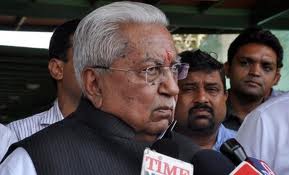
Ahmedabad, May 16: The former Gujarat Chief Minister, Keshubhai Patel, sharing a platform with Mahagujarat Janata Party (MJP) president Gordhan Jhadafiya has unnerved the ruling BJP in the State.
Mr. Patel said the Modi administration had become a “terror” for the people. “It is not the Patels alone, every section of the Gujaratis are living in a state of fear all the time under the present dispensation,” he told the convention organised here by the MJP.
Mr. Patel, who surrendered power to Mr. Modi 11 years ago after the party's central leadership felt he was not doing enough for the relief and rehabilitation of the killer earthquake-hit people in 2001, had always been critical of his successor, but so far preferred to stay behind the scene. He started criticising Mr. Modi before the 2007 Assembly elections also, but confined himself to addressing gatherings of the Patels only and as the situation started warming up, he withdrew and during the run-up to the elections, he did not address any meeting, including the BJP election meetings.
Sources in the party said the BJP high command, particularly veteran leader L. K. Advani, managed to bring Mr. Patel round before the 2007 elections and his staying away from the electioneering helped the party to woo back the Patel voters. But with Mr. Modi's relations with the party high command, including Mr. Advani, strained, the pro-Keshubhai lobby is hoping that the central leadership would not intervene this time to tame the former Chief Minister.
The increasing warmth between Mr. Patel and Mr. Advani was witnessed at a meeting of the Somnath temple trust, of which Mr. Patel was the chairman and both Mr. Advani and Mr. Modi its members, held in Gandhinagar last month.
If Mr. Patel goes all out against Mr. Modi, he is certain to get support from a number of other veteran leaders of the party in the State who have been finding themselves totally isolated and ignored. Besides Mr. Shankarsinh Waghela, “second pillar” of the BJP after Keshubhai Patel, who has since joined the Congress, several other senior party leaders like another former Chief Minister Suresh Mehta, the former Union Minister, Kashiram Rana, are waiting in the wings to join the fray against Mr. Modi.
Growing dissatisfaction
Mr. Jhadafiya, who is also a Patel, was a Minister in the Keshubhai Patel Cabinet and was known to be close to the former Chief Minister. But publicly they parted ways after Mr. Jhadafiya quit the BJP and formed the MJP following differences with Mr. Modi before the last elections.
However, the two leaders again appearing on one platform is certain to cause concern to Mr. Modi, particularly because of growing dissatisfaction against his administration among the “Patels.” Besides that the Patels feel that the Modi administration was focusing attention on the industrial sector than the agricultural sector, the bread and butter for the Patels.
The members of the community are also agitated that the Patels were bearing the brunt of the outcome of the court cases of the 2002 communal riots in the State. The State unit of the Vishwa Hindu Parishad, which at least was showing lip sympathy for the Patel convicts of the riot cases, was also totally opposed to Mr. Modi and could help the Patel leaders to mobilise Patel votes against the Chief Minister.





Comments
Add new comment